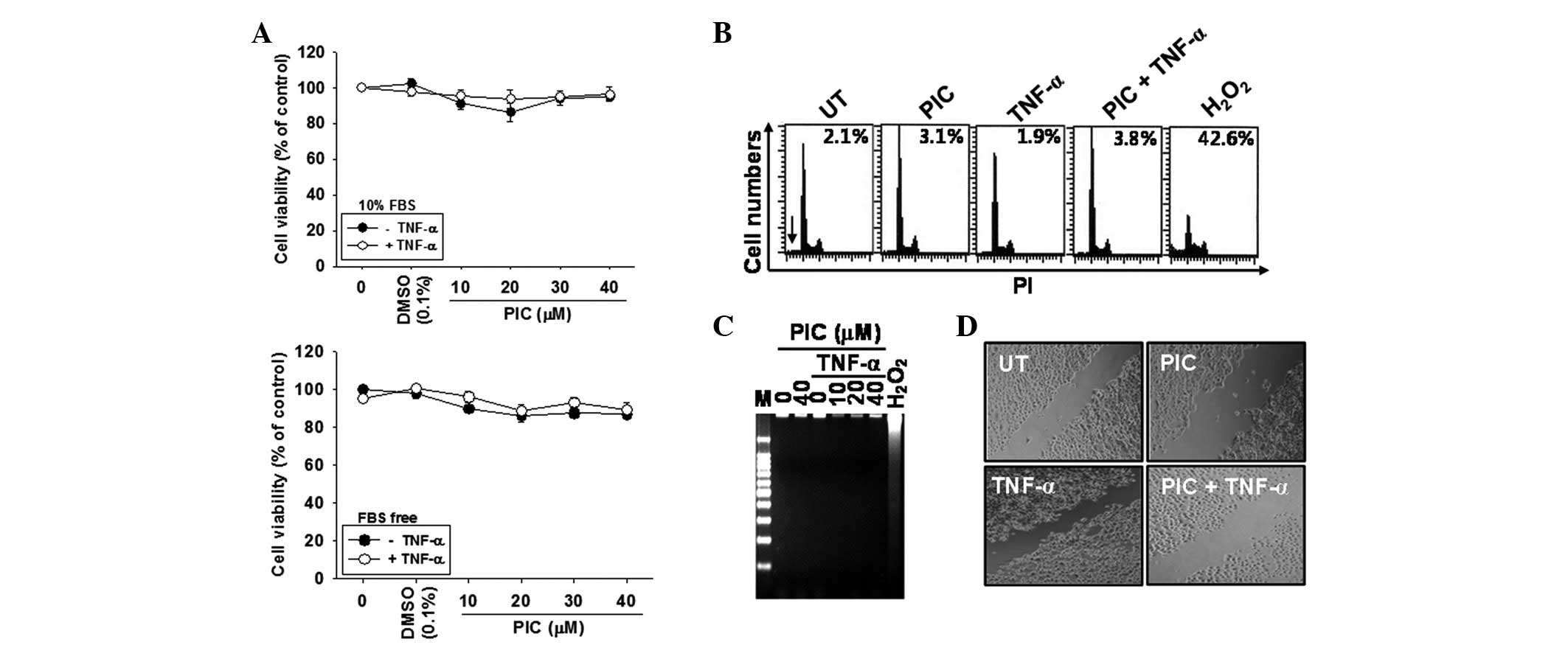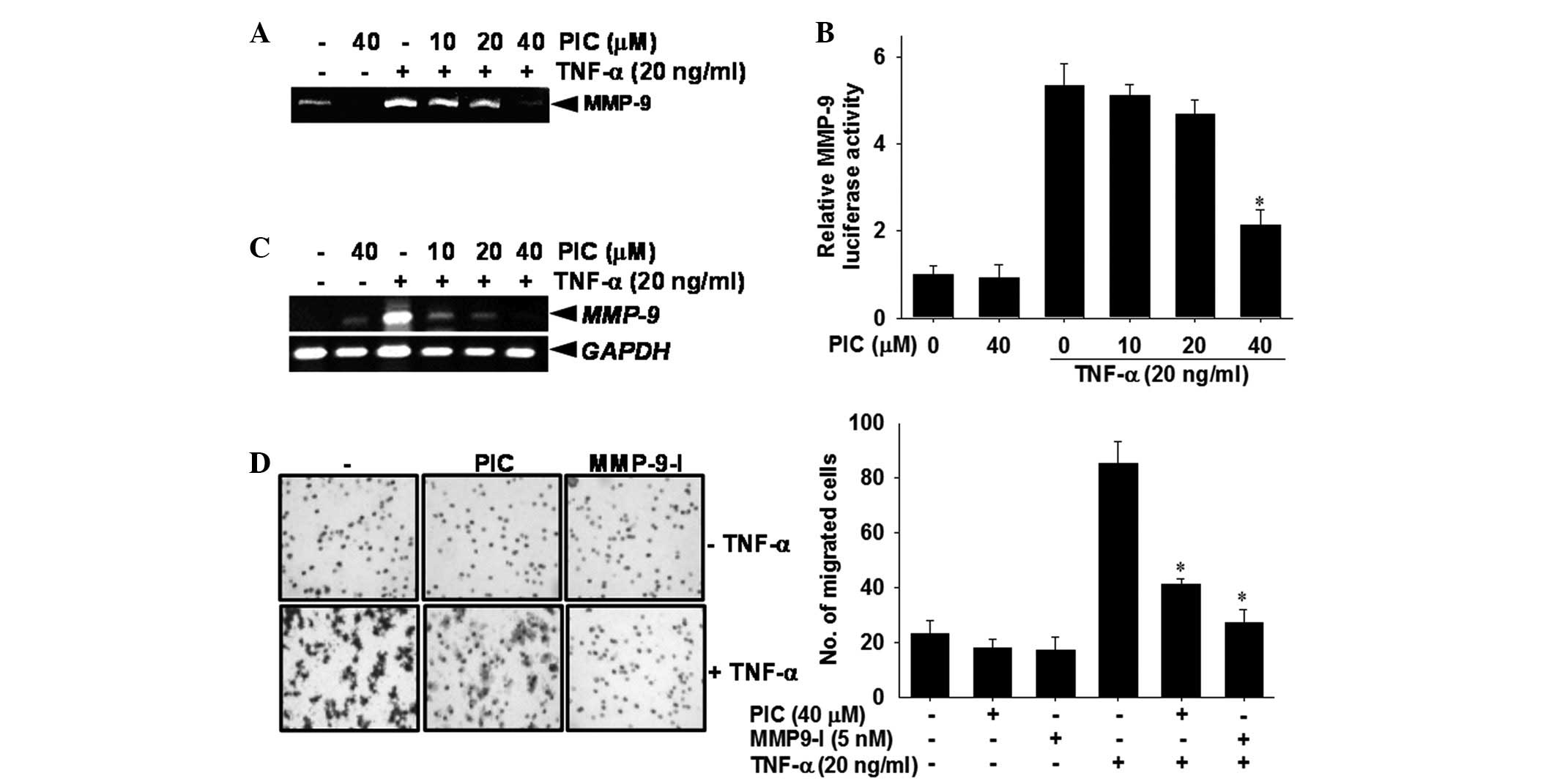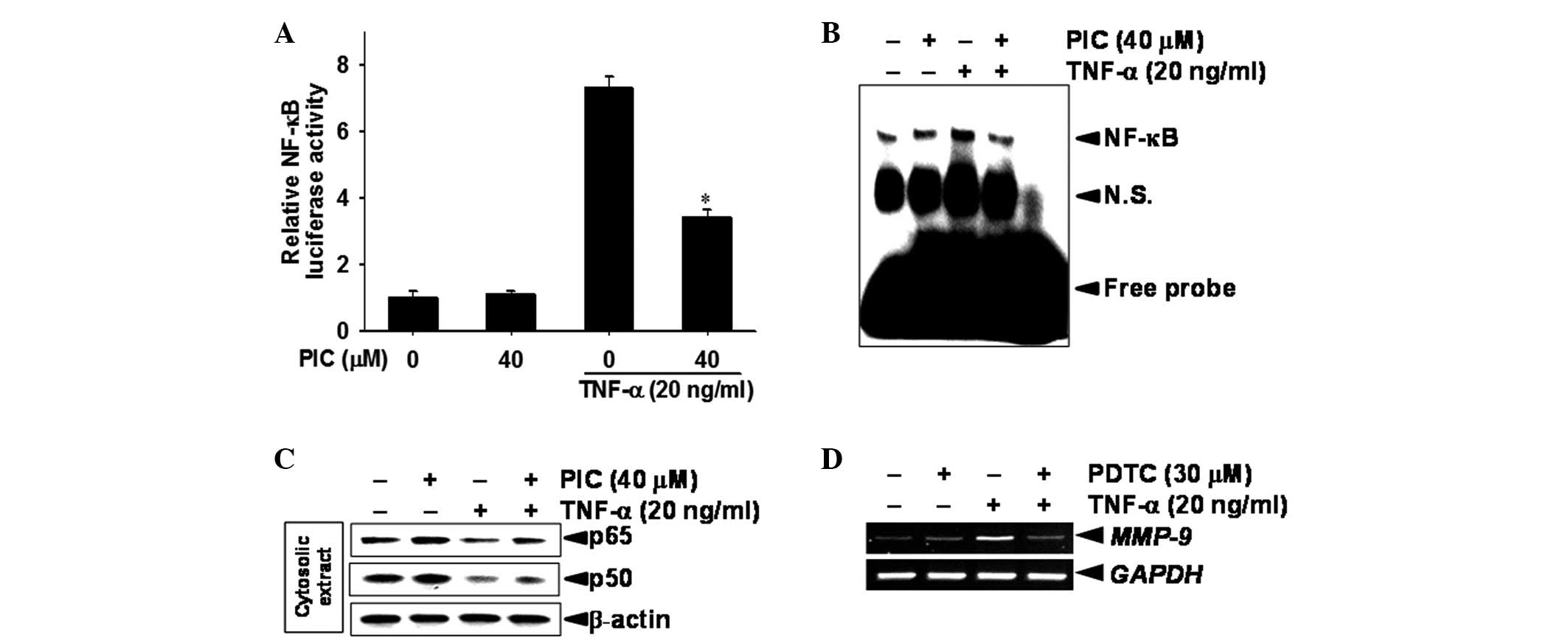|
1
|
Koutroulis I, Zarros A and Theocharis S:
The role of matrix metalloproteinases in the pathophysiology and
progression of human nervous system malignancies: a chance for the
development of targeted therapeutic approaches? Expert Opin Ther
Targets. 12:1577–1586. 2008. View Article : Google Scholar
|
|
2
|
Himelstein BP, Canete-Soler R, Bernhard
EJ, Dilks DW and Muschel RJ: Metalloproteinases in tumor
progression: the contribution of MMP-9. Invasion Metastasis.
14:246–258. 1994.PubMed/NCBI
|
|
3
|
Zucker S and Vacirca J: Role of matrix
metalloproteinases (MMPs) in colorectal cancer. Cancer Metastasis
Rev. 23:101–117. 2004. View Article : Google Scholar : PubMed/NCBI
|
|
4
|
Heo SJ, Park EJ, Lee KW and Jeon YJ:
Antioxidant activities of enzymatic extracts from brown seaweeds.
Bioresour Technol. 96:1613–1623. 2005. View Article : Google Scholar : PubMed/NCBI
|
|
5
|
Khan MN, Choi JS, Lee MC, Kim E, Nam TJ,
Fujii H and Hong YK: Anti-inflammatory activities of methanol
extracts from various seaweed species. J Environ Biol. 29:465–469.
2008.PubMed/NCBI
|
|
6
|
Brehmer B, Biesterfeld S and Jakse G:
Expression of matrix metalloproteinases (MMP-2 and -9) and their
inhibitors (TIMP-1 and -2) in prostate cancer tissue. Prostate
Cancer Prostatic Dis. 6:217–222. 2003. View Article : Google Scholar : PubMed/NCBI
|
|
7
|
Dasgupta S, Srinidhi S and Vishwanatha JK:
Oncogenic activation in prostate cancer progression and metastasis:
Molecular insights and future challenges. J Carcinog. 11:42012.
View Article : Google Scholar : PubMed/NCBI
|
|
8
|
Yoshida S, Ono M, Shono T, Izumi H,
Ishibashi T, Suzuki H and Kuwano M: Involvement of interleukin-8,
vascular endothelial growth factor, and basic fibroblast growth
factor in tumor necrosis factor alpha-dependent angiogenesis. Mol
Cell Biol. 17:4015–4023. 1997.
|
|
9
|
Ohshima H and Bartsch H: Chronic
infections and inflammatory processes as cancer risk factors:
possible role of nitric oxide in carcinogenesis. Mutat Res.
305:253–264. 1994. View Article : Google Scholar : PubMed/NCBI
|
|
10
|
Pahl HL: Activators and target genes of
Rel/NF-kappaB transcription factors. Oncogene. 18:6853–6866. 1999.
View Article : Google Scholar : PubMed/NCBI
|
|
11
|
Palayoor ST, Youmell MY, Calderwood SK,
Coleman CN and Price BD: Constitutive activation of IkappaB kinase
alpha and NF-kappaB in prostate cancer cells is inhibited by
ibuprofen. Oncogene. 18:7389–7394. 1999. View Article : Google Scholar : PubMed/NCBI
|
|
12
|
Lü L, Tang D, Wang L, Huang LQ, Jiang GS,
Xiao XY and Zeng FQ: Gambogic acid inhibits TNF-α-induced invasion
of human prostate cancer PC3 cells in vitro through PI3K/Akt and
NF-κB signaling pathways. Acta Pharmacol Sin. 33:531–541. 2012.
|
|
13
|
Roupe KA, Remsberg CM, Yanez JA and Davies
NM: Pharmacometrics of stilbenes: segueing towards the clinic. Curr
Clin Pharmacol. 1:81–101. 2006. View Article : Google Scholar : PubMed/NCBI
|
|
14
|
Kuo PL and Hsu YL: The grape and wine
constituent piceatannol inhibits proliferation of human bladder
cancer cells via blocking cell cycle progression and inducing
Fas/membrane bound Fas ligand-mediated apoptosis pathway. Mol Nutr
Food Res. 52:408–418. 2008. View Article : Google Scholar
|
|
15
|
Jin CY, Moon DO, Lee KJ, Kim MO, Lee JD,
Choi YH, Park YM and Kim GY: Piceatannol attenuates
lipopolysaccharide-induced NF-kappaB activation and
NF-kappaB-related proinflammatory mediators in BV2 microglia.
Pharmacol Res. 54:461–467. 2006. View Article : Google Scholar
|
|
16
|
Kang CH, Moon DO, Choi YH, Choi IW, Moon
SK, Kim WJ and Kim GY: Piceatannol enhances TRAIL-induced apoptosis
in human leukemia THP-1 cells through Sp1- and ERK-dependent DR5
up-regulation. Toxicol In Vitro. 25:605–612. 2011. View Article : Google Scholar : PubMed/NCBI
|
|
17
|
Dong Z, Bonfil RD, Chinni S, Deng X,
Trindade JC, Bernardo M, Vaishampayan U, Che M, Sloane BF, Sheng S,
Fridman R and Cher ML: Matrix metalloproteinase activity and
osteoclasts in experimental prostate cancer bone metastasis tissue.
Am J Pathol. 166:1173–1186. 2005. View Article : Google Scholar : PubMed/NCBI
|
|
18
|
Curran S and Murray GL: Matrix
metalloproteinases: molecular aspects of their roles in tumour
invasion and metastasis. Eur J Cancer. 36:1621–1630. 2000.
View Article : Google Scholar : PubMed/NCBI
|
|
19
|
John A and Tuszynski G: The role of matrix
metalloproteinases in tumor angiogenesis and tumor metastasis.
Pathol Oncol Res. 7:14–23. 2001. View Article : Google Scholar : PubMed/NCBI
|
|
20
|
Kong D, Li Y, Wang Z, Banerjee S and
Sarkar FH: Inhibition of angiogenesis and invasion by
3,3′-diindolymethane is mediated by the nuclear factor-kappaB
downstream target genes MMP-9 and uPA that regulated
bioavailability of VEGF in prostate cancer. Cancer Res.
67:3310–3319. 2007.
|
|
21
|
Bhoopathi P, Chetty C, Kunigal S, Vanamala
SK, Rao JS and Lakka SS: Blockade of tumor growth due to matrix
metalloproteinase-9 inhibition is mediated by sequential activation
of beta1-integrin, ERK, and NF-kappaB. J Biol Chem. 283:1545–1552.
2008. View Article : Google Scholar : PubMed/NCBI
|
|
22
|
Ganesan P, Matsubara K, Ohkubo T, Tanaka
Y, Noda K, Sugawara T and Hirata T: Anti-angiogenic effect of
siphonaxanthin from green alga, Codium fragile.
Phytomedicine. 17:1140–1144. 2010. View Article : Google Scholar : PubMed/NCBI
|
|
23
|
Lee SJ, Park SS, Lee US, Kim WJ and Moon
SK: Signaling pathway for TNF-α-induced MMP-9 expression: mediation
through p38 MAP kinase, and inhibition by anti-cancer molecule
magnolol in human urinary bladder cancer 5637 cells. Int
Immunopharmacol. 8:1821–1826. 2008.
|
|
24
|
Genersch E, Hayess K, Neuenfeld Y and
Haller H: Sustained ERK phosphorylation is necessary but not
sufficient for MMP-9 regulation in endothelial cells: involvement
of Ras-dependent and -independent pathways. J Cell Sci.
23:4319–4330. 2000.PubMed/NCBI
|
|
25
|
Mimeault M and Batra SK: Potential
applications of curcumin and its novel synthetic analogs and
nanotechnology-based formulations in cancer prevention and therapy.
Chin Med. 6:312011. View Article : Google Scholar : PubMed/NCBI
|
|
26
|
Lin AW, Chang CC and Mccormick CC:
Molecular cloning and expression of an avian macrophage
nitric-oxide synthase cDNA and the analysis of the genomic
5′-flanking region. J Biol Chem. 271:11911–11919. 1996.PubMed/NCBI
|
|
27
|
Ghosh S, May MJ and Kopp EB: NF-kappa B
and Rel proteins: evolutionarily conserved mediators of immune
responses. Annu Rev Immunol. 16:225–260. 1998. View Article : Google Scholar : PubMed/NCBI
|
|
28
|
Carpenter CL and Cantley LC:
Phosphoinositide kinases. Curr Opin Cell Biol. 8:153–158. 1996.
View Article : Google Scholar
|
|
29
|
Olson CM, Hedrick MN, Izadi H, Bates TC,
Olivera ER and Anguita J: p38 mitogen-activated protein kinase
controls NF-kappaB transcriptional activation and tumor necrosis
factor alpha production through RelA phosphorylation mediated by
mitogen- and stress-activated protein kinase 1 in response to
Borrelia burgdorferi antigens. Infect Immun. 75:270–277.
2007. View Article : Google Scholar
|
|
30
|
Roberts JR, Rowe PA and Demaine AG:
Activation of NF-kappaB and MAP kinase cascades by hypothermic
stress in endothelial cells. Cryobiology. 44:161–169. 2002.
View Article : Google Scholar : PubMed/NCBI
|
|
31
|
Behera AK, Thorpe CM, Kidder JM, Smith W,
Hildebrand E and Hu LT: Borrelia burgdorferi-induced
expression of matrix metalloproteinases from human chondrocytes
requires mitogen-activated protein kinase and Janus kinase/signal
transducer and activator of transcription signaling pathways.
Infect Immun. 72:2864–2871. 2004. View Article : Google Scholar
|
|
32
|
Jayasooriya RG, Choi YH, Moon SK, Kim WJ
and Kim GY: Methanol extract of Hydroclathrus clathratus
suppresses matrix metalloproteinase-9 in T24 bladder carcinoma
cells by suppressing the NF-κB and MAPK pathways. Oncol Rep.
27:541–546. 2012.
|


















